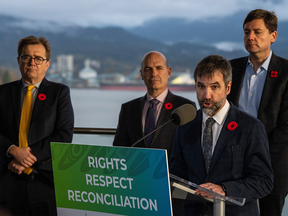Bloomberg News

Prime Minister Justin Trudeau has pledged to reduce Canada’s emissions by at least 40 per cent below 2005 levels by 2030, but the programs he’s relying on to get there have almost all seen significant delays in implementation.
“We found that the measures most critical for reducing emissions had not been identified or prioritized.”
The clean fuel regulations, for example, had initially been planned to roll out in 2019 but were delayed until 2023 due to two federal elections and the COVID-19 pandemic.
A draft proposal for an oil and gas emissions cap — a program meant to force fossil fuel companies to rein in their emissions — has still not been released, despite being initially planned for early 2023. Environment Minister Steven Guilbeault told Bloomberg in August that the proposal would “definitely” be unveiled before Nov. 30.
Proposed methane regulations have also been delayed.
In general, the delays were attributed to consultations with industry and other stakeholders taking longer than planned.
Trudeau’s signature climate policy remains the federal carbon tax implemented in 2019, but even that program is seeing friction. Last month, he suspended it on oil used for home heating, effectively bowing to political pressure in Canada’s eastern provinces, an electoral stronghold for Trudeau’s Liberals.
Several Canadian premiers are now demanding the same exemption on fossil fuels used to heat their residents’ homes, arguing the break is essential to combat rising prices.
Bloomberg.com
Share This:
Next Article




